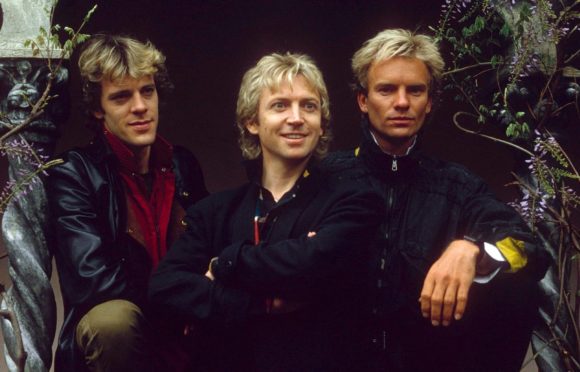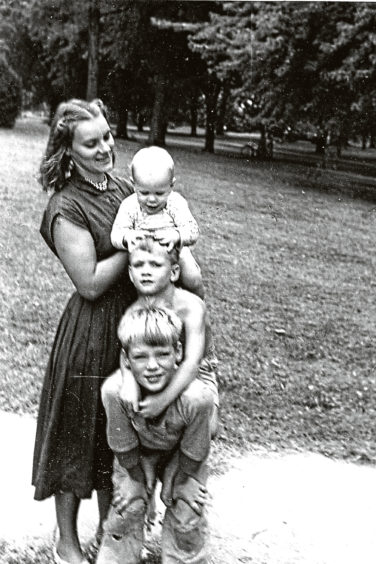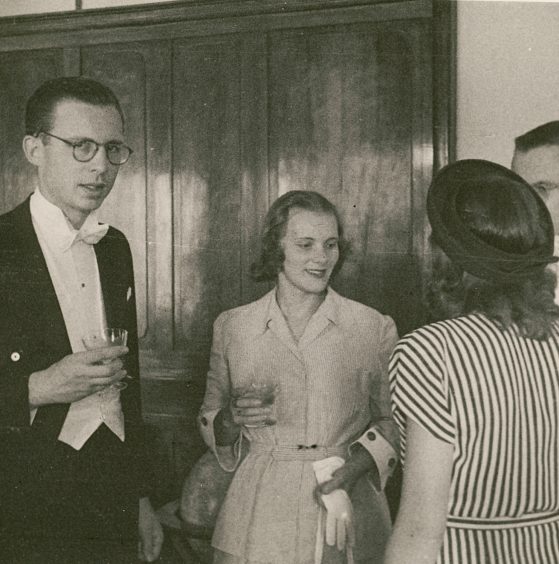
His father was a CIA spy embroiled in overthrowing governments in Syria and Iran and was close friends with Soviet double agent Kim Philby. But musician Stewart Copeland’s Scots mother, Lorraine Adie, had an equally secret and astonishing career – working for British intelligence during the Second World War.
The drummer with The Police explores the life of his father and his world of espionage in a new podcast but the Grammy-winning musician and composer also pays tribute to his mother, who inspired a musical career that has seen him sell 60 million records with The Police, as well as compose film soundtracks, ballets and operas.
Born in Leith in 1923, Lorraine was the daughter of neurologist William Adie, and opera singer Lorraine Stewart Patullo Bonar. Stewart said: My grandmother was a mezzo-soprano and sang all kinds of big roles. She sang with the Paris Opera and I have all of her scores here in California.
“She was effervescent, lively and the life of the party until her husband died. Then she became a recluse and my mother almost never saw her.”
Lorraine, just 12 when her father died, was sent off to be educated at a girls’ boarding school, Wycombe Abbey School in Buckinghamshire.
At the outbreak of the Second World War, she went to work for the Special Operations Executive, which was set up to conduct espionage and sabotage behind enemy lines in occupied Europe and was described as “Churchill’s secret army”.
It was in London she met and, after a whirlwind romance, married a dashing US agent, Miles Copeland, who was involved in efforts to feed misinformation to the Germans about the Allies’ plans for D-Day.
He said: “She had no idea what our father did but he had no idea what she did either. They were two spooks under one roof, both fighting to stop the Nazi bombs that rained down upon London. It’s really quite romantic.”
Lorraine, however, never discussed her wartime role with her children.
Stewart, speaking to The Sunday Post from his studio in Los Angeles, said: “As I understand it, her role was intercepting German radio and figuring out where their troops were and where to bomb.
“We never actually heard from our mother what she did during the war. We’ve heard about it and the work of the Special Operations Executive since, but she never regaled us with any stories.
“It’s sort of like if I’m hanging around with Sting and the subject of songwriting comes up, I shut the hell up. And when it came to spying, she didn’t depose or instal any dictators. She didn’t feel her contribution was as colourful as my father’s. He was the more eager storyteller.”
After the Second World War, Miles became one of the CIA’s first recruits and was posted to the Middle East, where Lorraine would develop an interest in archaeology. Stewart, who tells his parents’ story in a nine-part Audible podcast, My Dad The Spy said: “My father had a choice of either going to Argentina or Damascus, and she said, ‘Let’s go to the Holy Land, let’s go to the cradle of civilisation’.”
She would devote her working life to archaeology, making a major contribution to the knowledge of the pre-history of Lebanon, Syria, and Jordan, according to her contemporaries.
Stewart, born in 1952, the youngest of four children, would often join his mother on archaeological digs. He would find the expeditions in the Syrian desert enjoyable but his mother’s books on archaeology more challenging. He said: “Her books have always stopped me at the second word. They start with ‘The’, followed by an unpronounceable 14-syllable word.”
Stewart’s father Miles, meanwhile, worked for the CIA, using the cover of “cultural attaché” with the US Embassy in Damascus. He helped orchestrate coups in Syria in 1949 and Iran in 1953. The latter saw the replacement of the democratically-elected prime minister, Mohammad Mosaddegh, who sought to nationalise the country’s oil reserves, with the Shah, whose oppressive rule would last over a quarter of a century.
To Stewart and his siblings, his father was “just dad” who was “fun, funny and always full of stories”. They only learned about their father’s CIA career when he published his best-selling book The Game Of Nations: The Amorality Of Power Politics, in 1969 in which he revealed he had been an agent. Later, Miles would antagonise Sting when, on the eve of a tour by The Police in support of human rights organisation Amnesty International, he said the CIA “isn’t overthrowing enough anti-American governments or assassinating enough anti-American leaders, but I guess I’m getting old”.
Lorraine, however, was aware of her husband’s work. Stewart said: “She knew he was a spy. She might not have known all details but she knew he was messing with the destinies of nations.”
The couple would often host cocktail parties, inviting artists, poets, writers and “an ordinate number of colonels and military types”. Lorraine’s role would be to mingle with guests and ask where they were from and what they were interested in.
Stewart says in the podcast: “Looking back at the way our mother used to quiz people at these parties, I do wonder whether she knew what pappy was up to and whether her ‘fascinated’ questions about our ‘fascinating’ guests had a deeper purpose.”
According to Lorraine’s diaries, the Copelands were “dear friends” with former MI6 agent and journalist Kim Philby and his wife Eleanor.
“At parties, Kim was the cuddly teddy bear, outrageously pinching girls’ bottoms or boobs and getting drunk. We went on picnics, boat trips, to the races,” she wrote. Kim vanished on the night he was due to attend a diplomats’ party in Beirut with Eleanor and the Copelands.
Lorraine wrote: “While we were checking the police stations and hospitals, one of us had the nous to check the shipping departures at the port of Beirut.” Defecting to the Soviet Union, Philby had boarded a freighter to Odessa. He was later revealed to be a member of the Cambridge Five, the infamous spy ring which passed British secrets to the Soviets. Lorraine wrote in her diaries: “The next days were devoted to consoling a frantic Eleanor. I believe she eventually received a sign from Kim and prepared to pack up and move to Moscow.
“I was considerably shocked by the betrayal of our dear friend and constant companion and wrote so to Eleanor in a spirited correspondence. Kim added a note to her reply saying to the effect that we live many lives at once and that his life with us was not false. I was obliged to hand this letter over to the Agency.”
It was his mother who set Stewart on his musical career by buying him his first snare drum.
Stewart said: “My mother listened to Stravinsky, Ravel, Debussy and Carl Orff. Her musical sensibilities stuck with me.”
One of his treasured memories of his mother, who died in 2013, was her attending the premiere of his first opera, Holy Blood And Crescent Moon, in Cleveland in 1989. He said: “My mother was always very quiet, studious and learned, very much the academian, and my father was loud, noisy and dominated the conversation.
“All the old ladies fawned over her and treated her like royalty. That was the first time I saw her in that kind of environment. I’d only ever seen her at the family table sitting quietly as the Copelands engaged in political discourse.
“That night, she was belle of the ball.”
My Dad The Spy by Stewart Copeland is available to download from Audible.co.uk

Enjoy the convenience of having The Sunday Post delivered as a digital ePaper straight to your smartphone, tablet or computer.
Subscribe for only £5.49 a month and enjoy all the benefits of the printed paper as a digital replica.
Subscribe © SYSTEM
© SYSTEM